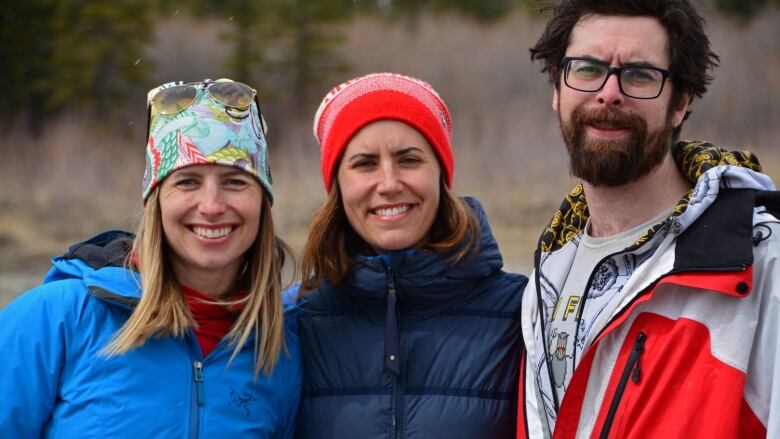Debilitating grief grips biathlete Rosanna Crawford as Olympics loom
Canadian's brother died of a suspected alcohol overdose on April 17

In recent years, Rosanna Crawford became accustomed to competing on the World Cup biathlon circuit in a personal cloud of uncertainty and fleeting hope.
You see, her brother Jordan battling addiction and mental health challenges often vanished for long stretches. Some nights, he showed up drunk on the doorstep. Some days, he cleaned up and flirted with sobriety, only to slip and start the cycle all over again.
Jordan Crawford died of a suspected alcohol overdose on April 17 in Calgary. He was 30.
For Rosanna, debilitating grief has replaced uncertainty and fleeting hope as she targets her third Olympic appearance at the 2018 Winter Games in Pyeongchang, South Korea.
"Jordan was always such a huge cheerleader for me," says Rosanna, whose older sister Chandra won gold in cross-country skiing at the 2006 Torino Olympics. "He always felt so bad that he was causing me stress.
"I want to honour his memory. Even though his death caused me a lot of stress, it's not going to stop me from chasing my dreams."
In spite of his troubles, Jordan chased and achieved his own dream of becoming a professional chef. He worked at some of the finest eateries in his hometown of Canmore, Alta., and eventually went to film school.
But addiction derailed him at every turn.
"You could always tell Jordan had anxiety," says Rosanna, who won World Cup silver in 2015 with Nathan Smith in the single mixed relay. "He was a scared little boy. And when he got into his teens, he might have turned to drinking and drugs to feel more comfortable in his skin.
"He used humour as a coping mechanism. It was always so hard to get past the outer shell with Jordan."
Rosanna, 29, has totally shed her own outer shell while training for Pyeongchang. Physical endurance is key to success in biathlon, a Nordic sport that combines cross-country skiing with rifle shooting. So too is mental focus.
With less than five months to the Olympics, she often feels like she is skiing uphill and shooting through dense fog.
"I think I underestimated how much of an impact grief can have on you," says Rosanna, who posted a career-best fourth place in a World Cup individual sprint race in the 2014-15 season. "It takes a lot of energy to cry and be sad all the time."
Embracing the tears
With the help of her teammates and coach Roddy Ward, Rosanna has learned to embrace the tears. After all, fighting them off is pointless when her heart is screaming for attention.
"Biathlon training at this level takes all of your energy 100 per cent focus and commitment," says Ward, high performance director for Biathlon Canada. "When you add in something like the death of a brother into the equation, it's really something that needs to be watched and balanced. It obviously takes a lot of energy to deal with that and start to heal.
"We've hopefully created an environment where Rosanna feels comfortable to let the emotions flow when they come up."
Sometimes, the happy memories are the hardest like when the biathlon team went to Sunshine Meadows to train (Rosanna has fond recollections of backcountry skiing and hiking in the Rocky Mountain paradise with her brother.) Even eating a mean plate of huevos rancheros one of Jordan's specialities in the kitchen can serve as a trigger.
And then there's the conversation that keeps running through her mind, the one when her dad called late at night to say her brother had died (Rosanna and Chandra were on holiday at the time in Hawaii.)
"It didn't feel real," Rosanna says. "Sometimes, it still doesn't feel real."
Eye on targets
Through it all, Rosanna pumps one ski boot in front of the other and keeps her eye on the targets while leaning on her tight-knit family to see her through.
"There's still so much stigma around mental health," she says. "Jordan was such an amazing human being so kind, so sweet. Jordan felt like such a burden, and all we wanted for him was to be happy."
In one candid 2013 Facebook post, Jordan wrote: "For those who fight for it, life has a flavour the sheltered will never know."
"I know I shouldn't feel guilty," Rosanna says. "But it sometimes feels like we didn't do enough."
Through counselling, Rosanna is coming to terms with the fact the entire family couldn't do anything more to save Jordan. But she wants to encourage others who are suffering to reach out before it's too late.
"I just hope other people don't have to go through this," she says. "I don't know a single elite athlete who doesn't work with a psychologist, and it should be viewed the same for people in every walk of life.
"If you need help, ask for it. Please don't be afraid."












_(720p).jpg)


 OFFICIAL HD MUSIC VIDEO.jpg)
.jpg)



























































































